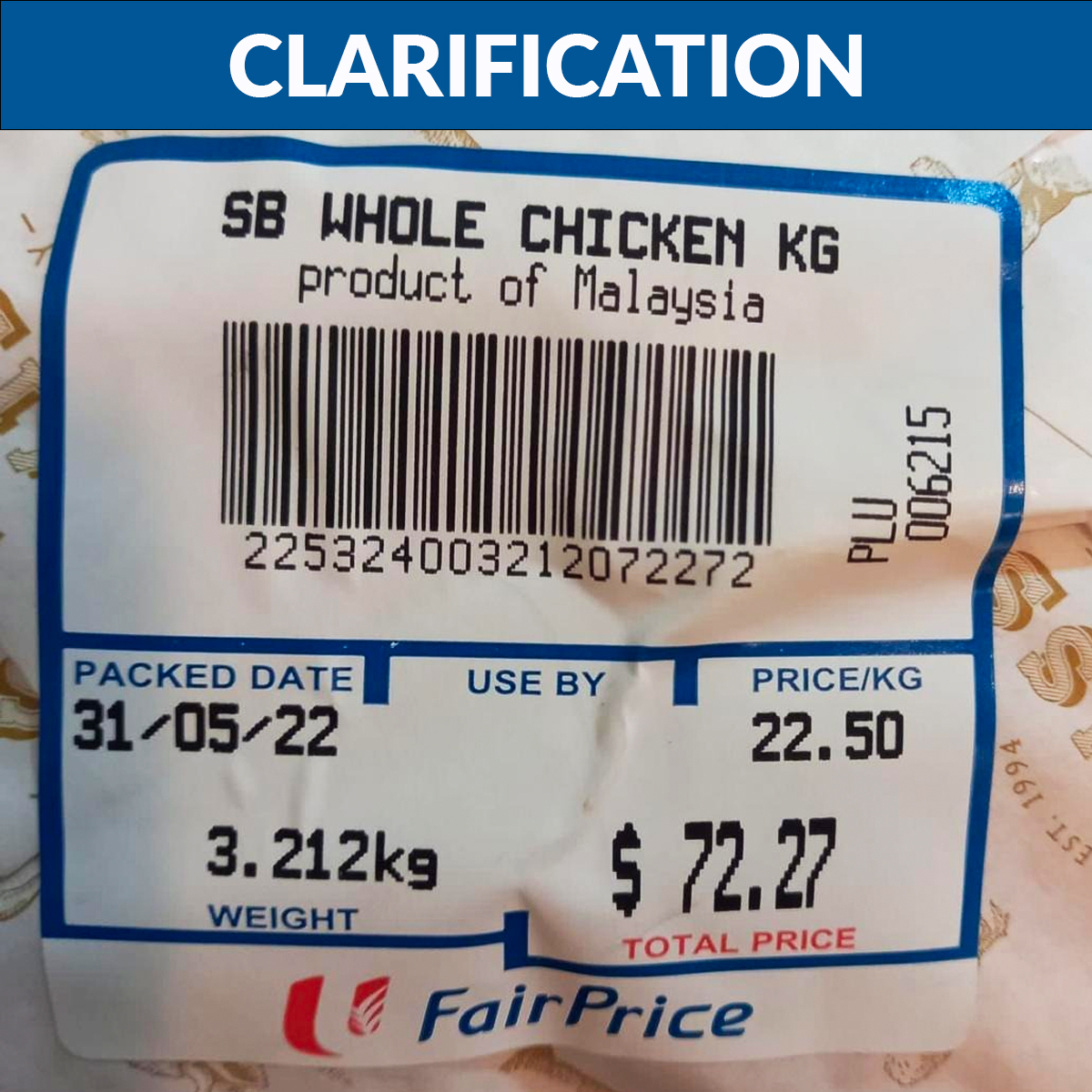NTUC has gotten into its fair share of PR trouble over chicken and price labels.
Thus, when a picture of a SB Whole Chicken, weighing 3.212kg, priced at $72.27 popped on the internet, just one day before the chicken export ban from Malaysia kicked in, it caused some murmurs to stir.

Another Mislabelling Incident?
At first, most netizens couldn’t believe their eyes, because FairPrice selling a whole chicken at $72.27 sounds preposterous.
Items in FairPrice shouldn’t be priced above $50, unless there’s an electronics section.
… Or if you’re talking about 25kg rice bags, but you get the point.
One netizen on the Hardwarezone forums questioned if it was a mislabelling incident where a turkey was mistaken for a chicken.
Others thought it might be a hoax, where the picture was photoshopped and uploaded to cause controversy over the rising chicken prices and chicken shortage. Some just laughed and thought it was the sequel to the weighing scale issue all over again.
Join our Telegram channel for more entertaining and informative articles at https://t.me/goodyfeedsg or download the Goody Feed app here: https://goodyfeed.com/app/
FairPrice: It Is Correctly Labelled
To everyone’s shock, however, FairPrice responded in a Facebook post to clarify that the price label is correct.

The supermarket further elaborates that “SB Whole Chicken” is provided by a vendor called Swiss Butchery, hence the “SB” at the front.
Apparently, the product has a fixed price of $22.50 per kg.
There are two whole chickens packaged together, which led to its weight of 3.212kg. A simple maths calculation will indicate that, yes, there is nothing wrong with the price label.
The reason why the chicken product is so expensive is because Swiss Butchery provides organic kampung chicken.
This means that the chickens are only fed organic feed, which cannot contain animal by-products, antibiotics, genetically engineered grains, or grains that have chemically fertilised or contaminated with pesticides.
Kampung chickens are also raised free ranged instead of being kept in cages.
At the end of the post, FairPrice writes, “We hope this helps to dispel any possible misunderstanding this image may have caused.”
It did not.
It only raised more confusion and disbelief.
The Netizens’ Response to the Facebook Post
As of writing this article, the Facebook post has been shared at least 1,200 times, liked by 2,400 users, and has 687 comments.
The shocked consumers wanted to know why the product was fetching at such a high price.
The most well-liked and relevant comment made by Angela Lau read, “There’s no misunderstanding here. We’re just appalled by the price of $22.50/kg for organic kampung chicken sold at NTUC FairPrice.”
The public can understand the tags “kampung” and “organic” making the chicken more expensive, but the majority still think that the price is ridiculous.
Another netizen in the thread jests, “These chickens drink Yakult, eat organic meals, listen to classical music, get daily exercise and sunshine. Worth it.”
Yeah, they also get daily massages and pedicures too. It’s all part of the package deal.
However, the best joke in the entire post should go to another pair of netizens, who jokingly claim that the chicken has the taste of Wagyu beef and should be called “Wahlau Chicken” instead.
There were some netizens who felt sympathetic towards FairPrice though.
They pointed out that FairPrice doesn’t owe the consumers an explanation for this.
By all accounts, it was the vendors who set the price, the supermarket is merely the aggregator of the products; the middleman, so to speak.
Apart from that, people just bluntly stated that people should quit complaining about the prices. If they can’t afford it, then ignore it and don’t buy it.
It’s not like the chicken is being shoved down your throats and you’re forced to accept it; there are plenty of other cheaper alternatives.
There were thoughtful suggestions and questions too, like how does the product get certified or recognised as “organic”?
If it’s the way that the poultry is raised or the produce is harvested that sets them apart, perhaps it would be best to avoid further misconceptions by giving it a stamp to mark it as an organic product, like how some poultry are specifically Halal-certified.
If FairPrice chooses to implement it—especially since not all outlets have the space for a shelf or section of organic products—it would go a long way to avoid having to clarify such matters again.
It does raise one last question though: if it’s already this expensive before the chicken export ban, how much will the price for these organic kampung chickens increase once it kicks in?
Maybe we’ll have our first $100 chicken.
Read Also:
- Song Ji-ah from Single’s Inferno Back on IG, This Time With a new Image After Being Cancelled
- D’Resort Reopening from 15 July With Up to 35% Off Early Bird Promotion
- Here’s Why it Won’t Matter if M’sia Bans the Export of Fish to S’pore
- Man Claimed to be Cheated by Waterloo Fortune Teller After Paying $188 for an Amulet
Featured Image: Facebook (NTUC FairPrice)
Would you be jailed for being half-naked in public? Well, the answer will shock you. Seriously. Watch this to the end and you'll understand:




